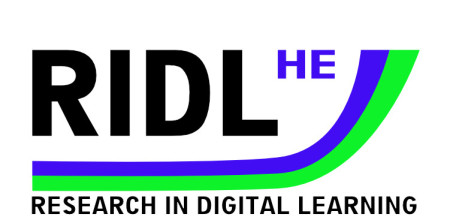RIDL:HE Research in Digital Learning in Higher Education Conference 2025

Category: Event
RIDL:HE Aims: - Offer a forum for disseminating and discussing high-quality rigorous and robust research in digital learning in higher education. - Provide a critical, collegiate, and impartial space for exploration and academic debate. - Proactively seek participation from those who are marginalised or less able to engage, providing inclusive and flexible ways to take part in the conversation. Scope The philosophy, practice, and politics surrounding the use of digital technologies in higher education globally. RIDL:HE is interdisciplinary in nature and does not privilege any form of research over any other. Criteria for submissions Submissions must be in English and will be reviewed against the following criteria: Relevance of the topic to the conference Originality of the paper Rigour of the research Significance of the research to the wider field Plan for engagement with delegates With a focus on rigorous research, we are looking for submissions in all areas relating to the novel, developing, effective or theoretical application of digital learning in Higher Education. As encoded in our Conference Design Principles: Accepted contributions will meet high standards of academic quality, including the incorporation of critique or new knowledge creation within the session delivery, as well as being presented in an engaging way, moving away from presentation of findings towards collaborative scholarship. Through the submission process, support will be provided for contributors to achieve high levels of quality and research engagement through mentorship. Publication Short and full papers will be published in the Research in Digital Learning in Higher Education open access journal, which will be launched in early 2025. Engaging with delegates We encourage presenters to consider interactive and participatory ways to engage delegates with their research. Rather than formal presentations of papers, we recommend alternative approaches including, but not limited to conversations, discussions, games, and demonstrations. As well as cabaret-style classrooms, we have a variety of other options on campus including break-out spaces, demonstration pods, computer labs, and outdoor spaces, and we encourage presenters to be creative in how and where the engage delegates. Submission types The following submission types are available: Full Paper A full research paper (maximum 5000 words, with shorter submissions also encouraged). Papers are expected to present original research and cover the following areas, with disciplinary flexibility in headings to fit the content/approach(es) detailed: Abstract; Introduction; Research design; Results; Discussion; Conclusions and References. In-person presenters You will be expected to lead a 60-minute facilitated and interactive conversation (although you can be more creative if you wish). Your submission should describe the design of this session. We expect that these sessions will take place in cabaret-style classrooms, but please specify in your submission if you require an alternative space. Online presenters If joining the conference as an online attendee, you will be expected to prepare a short (maximum of 6 minutes) film sharing your research or offer an interactive event as part of the online Fringe. Further guidance will be provided to accepted submissions. Short paper A short research paper (maximum 1000 words) can be used to share works in progress, position papers, or emergent ideas. In-person attendees You will be expected to lead a 20-minute interactive session with delegates. We expect that these sessions will take place in cabaret-style classrooms, but please specify in your submission if you require an alternative space. Online attendees If joining the conference as an online attendee, you will be expected to prepare a short (maximum of 6 minutes) film sharing your research or offer an interactive event as part of the online Fringe. Further guidance will be provided to accepted submissions. Workshop A workshop provides the opportunity for delegates to gain hands-on experience with your research. You will need to specify clear aims and outcomes for the session and how the session will be interactive. Abstracts are required, with a maximum of 500 words. Workshops can for 60 or 90 minutes and can take place in any of the available spaces; please specify your preferences during your submission. Workshops will be facilitated in-person only. Open call This is your opportunity to play. Pitch your own session and let us know the time you need and what physical space you’d like to use. Be as creative as you like in how you address the criteria. An abstract of up to 500 words is required. The Open call will be facilitated in-person only. Peer Reviews Please submit an anonymised paper or abstract. This will then be sent to two peer reviewers on the Academic Committee to review against the criteria. The conference committee will consider feedback from all reviews, which will be accepted as is, accepted with revisions, or rejected. In some cases, we may be able to offer mentorship to help people strengthen their submissions before the final submission deadline. In all cases, we will provide constructive feedback from reviewers. Submissions Submissions should be uploaded to Research in Digital Learning in Higher Education before the end of the 9th February 2025.
Initiator(s):
Northumbria University
Deadline: 09.02.2025
https://hosting2.northumbria.ac.uk/ridlhe/?page_id=119
Event
RIDL:HE Research in Digital Learning in Higher Education Conference 2025
03.09.2025 - 04.09.2025
Post created by: Lymor Wolf Goldstein